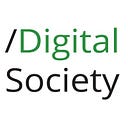Podcast transcript: Reflecting on your employability for a digital future
Hi from the Library Student Team! This podcast will focus on Week 10: Reflecting on your employability for a digital future.
TRANSCRIPT
ST1: Hi from the Library Student Team! I’m Dhillon and I’m Annabelle, and this week’s podcast will focus on Week 10 — Reflecting on your employability for a digital future.
ST2: The Digital Society podcast series has explored a huge range of topics, from AI and its ethical considerations to the rise of internet services such as ChatGPT, our relationship with them, and their implications for the future world. Now, as the course draws to a close, you all took some time to reflect on your experience and what you found the most interesting, of which one topic really stood out.
ST1: Absolutely, there was a resounding interest in the ‘smart cities’ module which showed how technology is deeply influencing our daily lives, and the issues that arise between using technology to make things “smarter”, but also not losing the human element of work within this transition.
ST2: Along this vein, a lot of you used great critical thinking skills to conjure important questions, especially around accessibility, and who may be left behind or need more support during these transitions into a more digital world?
ST1: Yes, these are really interesting considerations. Now a large part of the Digital Society course is preparing people with skills and knowledge that can be well transferred to work spaces and future jobs, so it seems fitting to use this last podcast to focus on this.
ST2: Absolutely, and it was interesting as we asked a lot of you to reflect on how well prepared you feel for future careers in this automated age, and the majority of responses were in the somewhat unprepared bracket with no one feeling very well prepared. Why do you think that might be, Dhillon?
ST1: Well, Annabelle, for me, this uncertainty about working in this digital age isn’t surprising at all! I think young people might feel apprehensive for multiple reasons. Some might be worrying about the ever-changing job market we are faced with. For example, increasingly more jobs revolve around technology and rely on things like AI. I think sometimes we forget how new tech like AI is, it’s so new we haven’t really seen how it can benefit us as the employees. It’s understandable that maybe young professionals see new tech as a threat to our employment opportunities, rather than a tool for support at work.
ST2: Yes, that makes sense. Although, luckily research shows us that AI is not around with the intention of replacing people but more to make current roles easier to assist the humans that are doing the work. This is especially relevant as automated services cannot do some of the more human things that are important for many roles, such as expression of empathy or even critical judgement and reflection.
ST1: Yes, and critical thinking and emotional skills are key qualities needed for digital jobs of the future, alongside creative skills, both of which many of you reflected on feeling more confident about after engagement with this course.
ST2: That is amazing! Much research online highlights the need for creativity and empathy to actually work together within technological design, as this is the key way to create content that engages with people and feels familiar, and this is something that AI cannot do in the same way. Technology has more emotional elements than we realise and human inputs and perspectives in technological design cannot be averted.
ST1: This is really important for sure. This brings in the important dimension of thinking critically about technology and although it may make things easier, thinking about the wider implications of increasing digitalization of society and workspaces. However, already many of you raised interesting concerns of corporations using technology and AI with a profit motivation, and how this can impact employees within a company.
ST2: Yes, that’s true. This point also connects to how the recruitment processes of corporations are changing and finding careers has become quite difficult. The traditional approach to job application is no longer enough and corporations are focusing more on transferable skills. This is where understanding the CAR formula, which was discussed during this week’s topic on Medium, can be useful while applying for jobs.
ST1: Yes absolutely, and it’s so impressive to see the examples you all have provided using the formula. Moreover, I agree that finding careers in the digital world can be difficult to navigate, but there are ways around this, such as the University of Manchester’s digital skills pathway. Annabelle, were you aware of this?
ST2: No I wasn’t, would you tell us more about that?
ST1: Yes sir! So you can access ‘The Digital Pathway’ through CareerConnect, and it is a great way to develop digital skills amidst the constantly evolving digital job market.
ST2: Wow, that is such a helpful resource. Well, I think the key things to note here are that the world is always changing but this doesn’t necessarily have to be a bad thing, and hopefully through this module and the course as a whole you have learnt skills and knowledge to prepare you for this, and feel less overwhelmed by any challenges and changes posed by AI and technology as a whole. But even the fact you came to do this course shows you already have the motivation it will take to succeed.
ST1: Absolutely. Before we wrap up, we would like to mention how much we’ve appreciated your active engagement with us throughout the course; your participation and insights have been invaluable. We hope you’ve enjoyed the conversations so far! Thank you and good luck.
